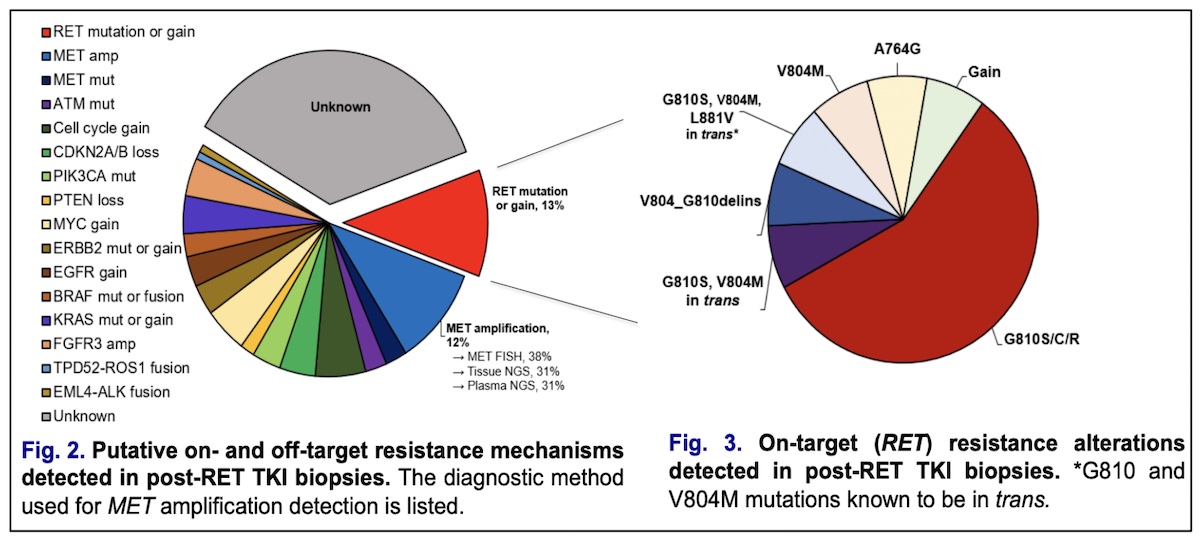Last week was the 2023 American Society of Clinical Oncology (ASCO) conference in Chicago. The six-day meeting brought together more than 40,000 people in cancer research, care, and advocacy to discover the latest innovations in cancer research, treatment, and prevention. Two research studies funded by The Happy Lungs Project were presented at ASCO.
Dr. Jessica Lin
First results from the RETgistry: A global consortium for the study of resistance to RET inhibition in RET-altered solid tumors.
Abstract #9065. There are currently 2 FDA-approved therapies for RET lung cancer, selpercatinib and pralsetinib that target specifically RET, but unfortunately within 1-3 years, many patients become resistant to the therapies and the cancer progress again. In an effort to understand the mechanisms of resistance to RET therapies, Dr. Lin’s team performed an analysis of 103 biopsies obtained from 88 patients who progressed on a RET inhibitor.
The analysis demonstrated that resistance to RET inhibition can happen by acquired mutations in the RET gene identified in 14% of the patients. Interestingly, they showed that the majority of RET inhibitor resistance is mediated by bypass mechanisms such as activation of alternative pathways in the tumors. This mechanism was found in 42% of patients with amplification of the MET gene being the most common one (14% of patients).
This study points out the urgent need of finding new therapies or more effective combinations for RET inhibitor resistance that is mediated by activation of alternative pathways.
Reference: Alissa Jamie Cooper, Alexander E. Drilon, Julia K. Rotow, Stephen V. Liu, Oliver Gautschi, Katherine Emilie Rhoades Smith, Dae Ho Lee, Misako Nagasaka, Herbert H. F. Loong, Nathan A. Pennell, Jyoti D. Patel, Martin Früh, Benjamin J. Solomon, Georg Pall, Natalie F. Uy, Jonathan W. Riess, Lori J. Wirth, Beow Y. Yeap, Justin F. Gainor, and Jessica Jiyeong Lin Journal of Clinical Oncology 2023 41:16_suppl, 9065-9065
Drs. John Heymach (MDACC) and Ralf Kittler (UTSW)
Genomic mechanisms of RET inhibitor sensitivity and resistance in RET-fusion positive cancer cells.
Abstract #e21029. Resistance to RET therapies can happen by acquired mutations in the RET gene which can develop in people and cause resistance to RET inhibitors. Drs. Heymach and Kittler’s teams published data from the LentiMutate approach, an innovative approach that aims to identify drug resistance acquired mutations in the RET gene before they happen in patients. They were able to identify the G810S RET mutation that was associated with acquired resistance to both RET inhibitors selpercatinib and pralsetinib in RET cancer cells, consistent with prior reports. Importantly, they also identified the V804M/E and M918T mutations that were associated with acquired resistance to the RET inhibitor selpercatinib but not pralsetinib, and L730I/V and E732K mutations that were associated with resistance to pralsetinib but not selpercatinib.
This study demonstrates that individual RET fusion lung cancer variants have distinct drug sensitivity profiles and that acquired resistance mutations may be non-overlapping between the RET inhibitors.
Reference: John Heymach, Monique B. Nilsson, Xiaofang Huo, Ashwani Kumar, Jun He, and Ralf Kittler. Journal of Clinical Oncology 2023 41:16_suppl, e21029-e21029


